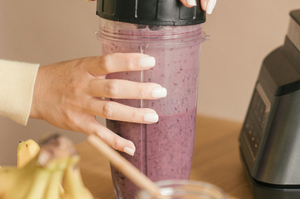
10 healthy habits to follow every day
When we think about happiness, we might sometimes overlook the small parts of our day that make a big difference to our overall wellbeing. While holidays and having nice things are obviously great, the small habits you consistently do each day are what help to make you feel good.
As a personal trainer and nutrition coach, a huge part of my job is helping my clients create healthy habits tailored to their lifestyle, and then supporting them so that they stick to them.
It’s important the habits you form are suitable for you and are achievable; being able to successfully complete these small tasks is what turns them into habits and not one-offs. Here are ten healthy habits which you might want to try implementing into your own life.
1. Drink enough water
Our bodies are made up of roughly 60% water, so it’s no wonder it’s important we drink enough of it. I know what you’re thinking: how much is enough water? The amount of water we should be drinking depends on a few things, such as our total bodyweight and the amount of activity we’re doing. Remember, we lose water through sweat! Drinking 30-40ml of water per kilogram of bodyweight is a good rule of thumb to ensure you’re hydrated. For example, a 70kg person would need between 2,100ml and 2,800ml of water per day.
2. Follow a consistent sleep schedule
This isn’t always easy, as sometimes we might have responsibilities that mean we can’t stick to a consistent sleep schedule. But the more often we can go to sleep and wake up at the same time, the better. We all have different sleep requirements, and while seven to eight hours of sleep a night is recommended, your own circadian rhythm might be different. Falling asleep at the same time each night can help you to fall asleep faster, and waking at the same time each day can help you to feel refreshed in the morning.
3. Wear sun cream
Don’t worry, I’m not going to break into Baz Luhrmann’s ‘Everybody’s Free (To Wear Sunscreen)’. But it’s true; we take care of our gut health by eating well, we take care of our bodies by exercising, and we should be taking care of our skin by wearing sun protection every day. Even if it’s overcast outside, the clouds can’t stop harmful UV rays. Each morning after you wash your face, take the time to apply a teaspoon’s worth of sun cream to your face and neck, as well as other areas of exposed skin.
4. Practise gratitude
Practising gratitude isn’t an obvious habit to introduce to your daily routine, but it can make a huge difference to your outlook on life each day. Try picking three things you’re grateful for and writing them down. These don’t need to be complex; it could be as simple as being grateful for your morning coffee, or the sun in the sky that will make your journey to work that little more enjoyable.
5. Eat a balanced diet
It sounds obvious, but when we pay attention to the food we eat, we become more aware of how it’s affecting our bodies. Around 95% of the body’s mood-boosting hormone, serotonin, is produced in the gut.[1]We should aim to eat a balanced diet containing protein, carbohydrates and fat. And, if we can, we should eat a balanced proportion of each of these in every meal, along with fibre. Live bacteria supplements are also a fantastic additions to our diets to support our gut health, with 80% of the communication signals between the gut and brain starting in the gut.[2]
6. Have a good morning routine
A good morning routine helps to set us up to have a good day. A lot of the habits listed in this article can be incorporated into your morning routine, and completing these habits early in the day helps to make sure they’re done before other areas of our lives take priority. If you want to know how to build your own morning routine, you can read our ‘How long should a good morning routine be?’ article.
7. Set boundaries
“Your calm mind is the ultimate weapon against your challenges.” – Bryant McGill, Bestselling Author and Activist.[3]
Setting boundaries ensures that you're keeping your peace mentally, and gives you more space to focus on what does matter to you. These boundaries are individual to you and what does or does not make you feel good. For example, start spending your time more wisely; do things that you enjoy and leave you feeling energised. For some this could be spending more time with friends and family, for others this could be more time on their own trying new hobbies.
8. Cut down on your screen time
We live in an age where our phones are usually with us 24/7. Because of this, we can spend hours a day glued to our screens. This ties into setting boundaries, but just because you have access to your phone 24/7 doesn’t mean everyone should get access to you all day long. Leave work emails for working hours , and manage the amount of time you spend on social media. Some mobile devices even allow you to set a limit on your usage of apps to ensure you’re not mindlessly scrolling your day away.
9. Exercise regularly
Turning regular exercise into a habit rather than seeing it as a chore can do wonders for your physical and mental health. Our bodies benefit from different styles of exercise. For example, cardiovascular activities such as running or cycling aid our heart health, while resistance training such as weightlifting can improve our muscular function and bone density. It’s also good to make stretching a regular habit to help support flexibility and improve circulation, whether that’s through something like yoga or a few simple daily stretches.
10. Spend time outside
We can sometimes take for granted the beauty just beyond our front door. Sunlight is our body’s main source of vitamin D. Vitamin D helps to support our immune system and is important for our body’s ability to absorb minerals such as calcium and phosphorus, which are good for our bones and teeth. Spending time outside also helps to regulate our circadian rhythm, and the better we sleep, the better our wellbeing.
A habit isn’t just about deciding one day that you’re going to do X, Y and Z from now on – it takes time to make something habitual. A useful method for forming a habit is using the cue-routine-reward loop; start with a cue that will trigger the routine, then perform the routine (the new habit), followed by the reward which reinforces the behaviour. For example, the cue might be putting on your workout clothes in the morning, the routine is doing the workout, followed by a delicious breakfast as the reward.
1 Source: The Gut-Brain Axis: Influence of Microbiota on Mood and Mental Health
2 Source: The gut-brain axis interactions between enteric microbiota, central and enteric nervous system, NLM 2015
3 Source: Simple Reminders: Inspiration for Living your Best Life by Bryant McGill









